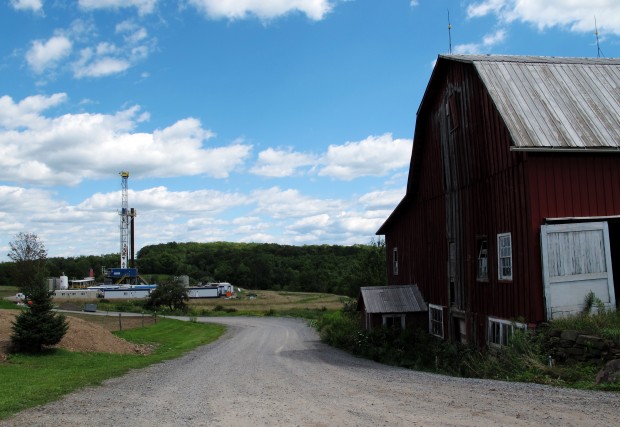
Both impact fee bills bar local governments from barring drilling in residential zones
Scott Detrow / StateImpact Pennsylvania


Both impact fee bills bar local governments from barring drilling in residential zones
Scott Detrow / StateImpact Pennsylvania

Scott Detrow / StateImpact Pennsylvania
Both impact fee bills bar local governments from barring drilling in residential zones

Scott Detrow / StateImpact Pennsylvania
Both impact fee bills bar local governments from barring drilling in residential zones
The legislation requires municipalities’ ordinances to “provide for the reasonable development of minerals.” What’s reasonable? By and large, that’s for the Attorney General and the Commonwealth Court to decide. But the bills both set parameters local governments would be required to follow.
Municipalities would have to:
How would the new statewide standards be enforced? That’s where the Attorney General comes in.
Under the legislation’s setup, if a drilling company thinks a municipal ordinance is unreasonable, it can file an appeal with the Attorney General. The AG would then review the zoning language, and issue a ruling within 120 days. If the office deems the ordinance unreasonable, the municipality doesn’t get any impact fee revenue.
There’s more, though: the legislation would allow the Attorney General to file suit against the local government in Commonwealth Court, in order to invalidate the ordinance. Effectively, the Pennsylvania Attorney General would be suing on behalf of an aggrieved drilling company. If a special master appointed by Commonwealth Court rules on the driller’s behalf, the court would have the power to make the municipality pay both sides’ legal fees.
The setup is based on the 2005 ACRE law, which imposed similar restrictions on municipal zoning of agricultural activity. Like the impact fee bills, the law had a goal of barring local governments from crafting zoning regulations designed specifically to crack down on local farming activities – specifically, the creation sludge pools on large-scale industrial farms. The law prohibited local governments from enacting zoning that, “prohibits or limits a normal agricultural operation.” Here, “normal” meant day-to-day activity geared toward raising livestock or growing crops, and preparing products for sale.
If an agricultural producer takes issue with a municipal ordinance, it files a complaint with the Attorney General, who has the power to sue a municipality. Since the law went into effect, the Attorney General has gotten “15 to 20 requests a year,” according to Ross Pifer of the Penn State Dickinson School of Law, who wrote an article analyzing the ACRE law in 2010. “The Attorney General generally accepts about half, meaning [the office] feels about half of those ordinances would be considered unauthorized.” Most of the time, the municipality works with the Attorney General’s office to amend its language, and avoids a court case. “A relatively small number of cases have required litigation,” said Pifer. “But I think a lot of…disputes have been resolved through the process that’s set up.”
The Attorney General’s spokesman did not return a call for comment on how effective the ACRE setup has been for the department, and how many staffers are devoted to working on municipal challenges. Governor Tom Corbett served as Attorney General, of course, from 2005 to January 2011. His spokesman did not respond to calls for comment on ACRE, either.
The setup has its critics. In 2009, a group opposed to a large-scale pig farm in Peach Bottom Township, York County, rallied in the Capitol against what they framed as an unfair restriction on a local government’s right to regulate what happens within its boundaries. The law renders a municipality incapable of protecting its “health, safety and welfare,” activist Laura Yanney said at the time, according to an article published by Capitolwire.
Republican Senator Joe Scarnati’s top staffer, Drew Crompton, disagreed, calling the legislation a success. “Five years ago we had a real dust up. …communities were rebelling, trying to get local governments to restrict where agricultural farmers could put these sludge pools.” Creating a situation where the Attorney General would rule on local ordinances eliminated the pressure residents were placing on their township supervisors, to draft zoning aimed at individual farmers, he argued.
Crompton said he hopes the impact fee bill will have a similar effect. “It empowers the Attorney General to call balls and strikes, and say…whether zoning is out of bounds or not.”
StateImpact Pennsylvania is a collaboration among WITF, WHYY, and the Allegheny Front. Reporters Reid Frazier, Rachel McDevitt and Susan Phillips cover the commonwealth’s energy economy. Read their reports on this site, and hear them on public radio stations across Pennsylvania.
(listed by story count)
StateImpact Pennsylvania is a collaboration among WITF, WHYY, and the Allegheny Front. Reporters Reid Frazier, Rachel McDevitt and Susan Phillips cover the commonwealth’s energy economy. Read their reports on this site, and hear them on public radio stations across Pennsylvania.
Climate Solutions, a collaboration of news organizations, educational institutions and a theater company, uses engagement, education and storytelling to help central Pennsylvanians toward climate change literacy, resilience and adaptation. Our work will amplify how people are finding solutions to the challenges presented by a warming world.